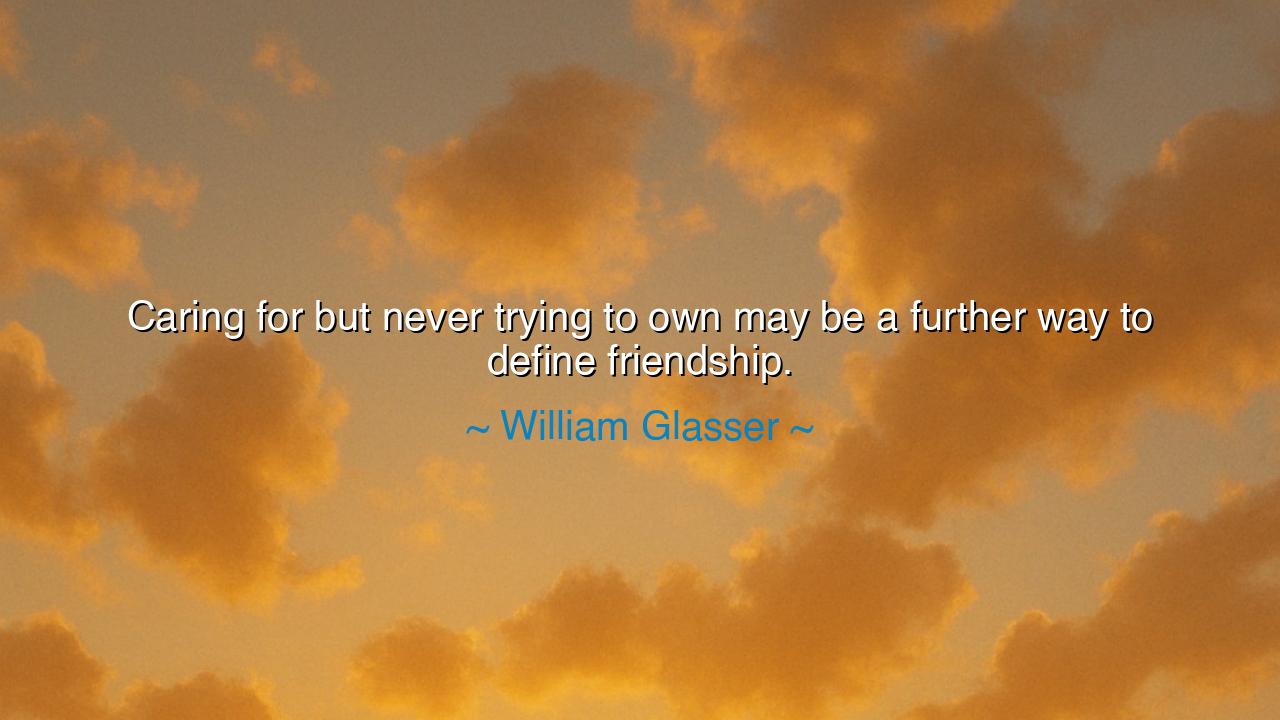
Caring for but never trying to own may be a further way to define






"Caring for but never trying to own may be a further way to define friendship." These profound words by William Glasser offer a deep reflection on the nature of friendship, urging us to understand that true friendship is grounded in care and respect, rather than in the desire to control or possess another person. Glasser’s insight speaks to the importance of autonomy within friendship—that while we may deeply care for another, the essence of friendship lies in recognizing the independence of the other person, rather than seeking to possess or dominate them. This understanding of friendship calls for a selfless commitment to mutual respect, where each individual maintains their own identity while supporting and caring for one another.
In the ancient world, the relationship between care and ownership was often a subject of deep philosophical inquiry. Aristotle, in his work Nicomachean Ethics, distinguished between various kinds of relationships, noting that true friendships are those in which both individuals seek the good for the other, rather than seeking any form of personal gain or possession. For Aristotle, friendship was rooted in virtue and mutual respect—not in the desire to control or manipulate the other person. This aligns perfectly with Glasser’s view, as it emphasizes that friendship flourishes only when both parties are free from the need to possess one another, and instead, find fulfillment in caring for each other.
An example of this can be seen in the relationship between Socrates and his students. Socrates did not seek to own or control his students; rather, he encouraged them to think critically and to question the status quo. His friendship with Plato and the others was not one of possession, but one of deep mutual respect and the shared pursuit of truth. Socrates cared deeply for his students, but he never sought to possess them or make them dependent on him. Instead, he believed that the highest form of friendship was one in which both individuals were free to pursue their own virtue and wisdom. This kind of relationship is the very essence of Glasser’s view, where care is paramount, but ownership is absent.
Glasser’s perspective can also be illuminated through the bond between David and Jonathan in the Bible. Their friendship, celebrated as one of the most profound in history, was built on a foundation of mutual respect and support, rather than control or domination. Despite the political and familial pressures they faced—Jonathan being the son of King Saul and David the future king—their friendship transcended these external forces. Jonathan did not seek to own David, nor did he expect David to belong to him in any way. Instead, they shared a deep caring for each other, rooted in respect for each other’s strength and character. Jonathan even chose to support David’s destiny, despite the personal cost to his own position in his father’s court. This selflessness is the essence of Glasser’s view of friendship—that true care for someone means allowing them to be themselves and supporting their growth, even if it means relinquishing any claim to their identity or future.
The lesson here is a timeless one: friendship is not about control, but about mutual respect and freedom. Glasser reminds us that to truly care for someone is to allow them the freedom to live their life, to be their own person, without trying to shape or possess them. In today’s world, where relationships are often clouded by expectations and possessiveness, Glasser’s words urge us to take a step back and ask ourselves whether our relationships are built on respect and freedom, or whether we are unconsciously trying to possess those we love. True friendship comes when we recognize that we do not own the people we care for; instead, we are entrusted with their trust and companionship, and it is our duty to honor that trust with respect.
Consider the many ways we can apply Glasser’s wisdom in our own relationships. Are we allowing those around us to be their true selves, free from our attempts to control or possess them? In friendship, are we truly offering support and care, or are we seeking to influence or shape the other person’s choices? The freedom of the other is a sacred trust, and by honoring it, we not only create healthier relationships but also enrich our own lives. The best friendships are those in which both people are free to grow and change without fear of being owned or controlled, but rather, supported and loved in their journey.
Ultimately, Glasser’s view of friendship serves as a reminder to embrace relationships that foster respect and freedom, rather than domination. To care for someone, but not to own them, is to practice the highest form of selflessness—a friendship that is not bound by expectations but by the pure desire to see the other flourish. Let us seek to build relationships, not out of the desire to possess, but to support and celebrate each other’s growth, knowing that such bonds are the most lasting, fulfilling, and authentic.






AAdministratorAdministrator
Welcome, honored guests. Please leave a comment, we will respond soon